
Taking on a cat is a big responsibility. New cat owner anxiety, where feelings of overwhelm and stress emerge after bringing a new pet home, can be difficult to experience. However, these feelings are common and do subside with time.
Struggling with the reality of owning a new cat is common though rarely discussed. To reduce your anxiety, focus on providing for your cat's basic needs, settling into a routine, forming a bond, and most of all, being patient. To help a cat feel more relaxed in their new home, provide plenty of hiding places, treats, and enrichment, and spend time with them.Key Takeaways
A new cat arriving should be a joyful occasion, and there are ways to help manage these negative feelings. Being prepared, forming a bond, spreading the load, and allowing yourself some time and patience can all help to ease gently into the new routine. Your new feline may also find the move stressful, so we go through some top tips to help them settle into their forever home.
What Is New Cat Owner Anxiety?
The process of bringing a new cat into your home, whether a kitten or adult, adopted or purchased from a breeder, should be a time of great anticipation and joy. However, for many, it is tinged with anxiety, guilt, doubt, and fear. New cat owner anxiety is rarely discussed, but more common than you might think, so if you’re struggling with the reality of owning a new cat, you’re not alone.
This form of anxiety is usually brought on immediately after the new pet arrives when the owner feels overwhelmed with the responsibility of owning a pet. Having a new addition to your home is a big change: to your routine, your responsibilities, your possessions, and even your financial situation. It is perfectly normal to experience some doubts.
Owner anxiety is often exacerbated if the new cat also has symptoms of anxiety. Moving to a new home can be a stressful experience for cats, and can lead to a behavior problem such as inappropriate elimination, destructiveness, or excessive vocalization. These behaviors can act as anxiety triggers for the new owner, and a spiral of stress is born.
How Can I Overcome New Owner Anxiety?
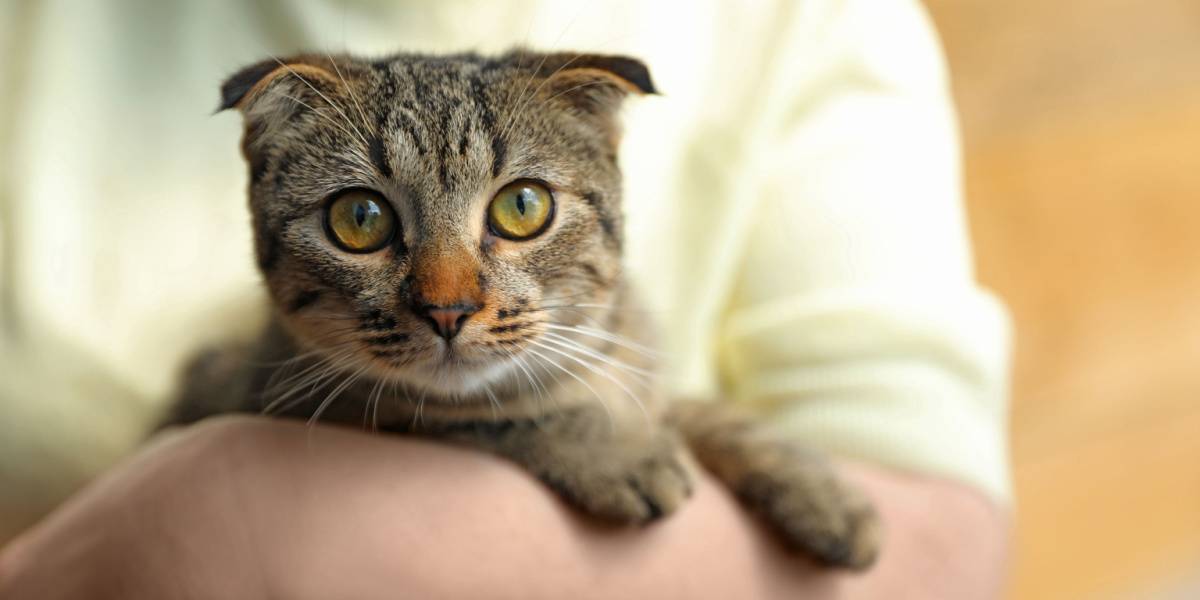
Over time, feelings of anxiety regarding caring for your new cat generally subside.
If you’re in the depths of anxiety over your new pet, you might be comforted to know that these feelings do pass. We all worry about our beloved cats, of course, but those feelings become more manageable. Taking time for both cat and owner to adjust to their new situations is key, as is being practically prepared for the first weeks of your shared life together.
1. Focus on the Basics
If you’re concerned about the responsibility of owning a feline companion, it can be reassuring to make a checklist of their basic needs and make sure everything is ticked off. To start with, it is recommended to restrict a new cat to a small, safe area of your home where they can take some time to settle in and orientate themselves.
They will need:
- Food and water bowls (preferably not too close together)
- Litter tray
- Comfy bed and blanket
- Toys and enrichment
- Scratching post
You might want to provide many other things in time, but these are the basics. If you have all of these, you can rest a little easier knowing that your new cat will be warm, safe, fed, and watered. You might also want to book them an appointment with a veterinarian for a health check to reassure yourself that there are no symptoms of any medical conditions.
2. Settle Into a Routine
Owning a pet, especially a first pet can mean large changes to our daily routines, habits, and environment. Part of new cat owner anxiety can be centered on remembering to perform certain duties, such as filling the food bowl or emptying the litter box.
Getting into a strong routine can help both owner and cat to adapt to their new lives together. A predictable routine will help anxious cats to settle, and help owners feel more secure in their new role.
3. Form a Bond
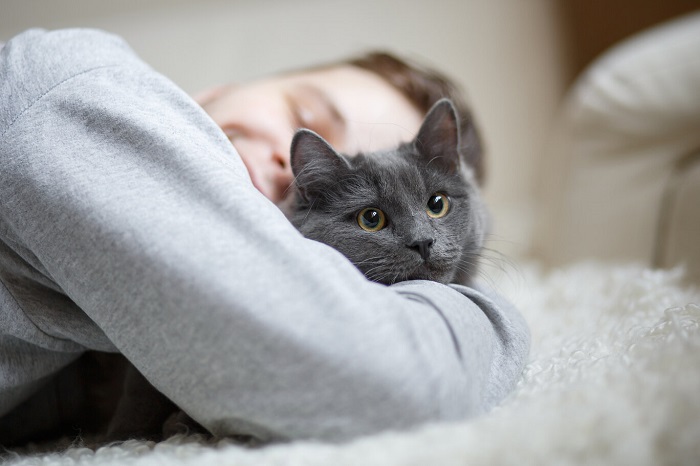
As your bond with your cat grows, your feelings of overwhelm should diminish.
Cats can be social creatures, and spending time with your new pet will help reduce anxiety and strengthen connections. Active interactions such as playing, grooming, or feeding treats are excellent ways to bond with a cat.
However, more passive interactions such as just being present in a room with them can also be valuable. These quieter bonding sessions might be more appropriate if the new arrival has any signs of stress, such as a lot of hiding behavior or excessive grooming.
4. Time and Patience
Be kind to yourself, and accept that it will take some time for you to adapt to having a pet in the household and that the anxiety will diminish as time passes and the new becomes normal. As a general rule, follow the “rule of three.”
After three days you and your new cat will likely be feeling overwhelmed. After three weeks you and your cat are both starting to relax into pet ownership, and by three months a new pet is usually settled fully into their new home.
5. Remember To Take a Step Back
If you are feeling concerned about your new cat, it can feel like the right thing to do to spend all your time with them. However, this can be very overwhelming and can lead to signs of separation anxiety in your cat when you do leave. Sharing the responsibilities can help pace yourself in your new role as a cat owner, and give you an escape when anxiety is high.
6. Look on the Bright Side
There is plenty of research that shows pet ownership can be a real positive in our lives. Companionship, support, and a solid routine can all be provided by our loving cats, and once the initial period of anxiety and adjustment is over, these benefits will make themselves known.
How Do I Help My Cat’s Anxiety?
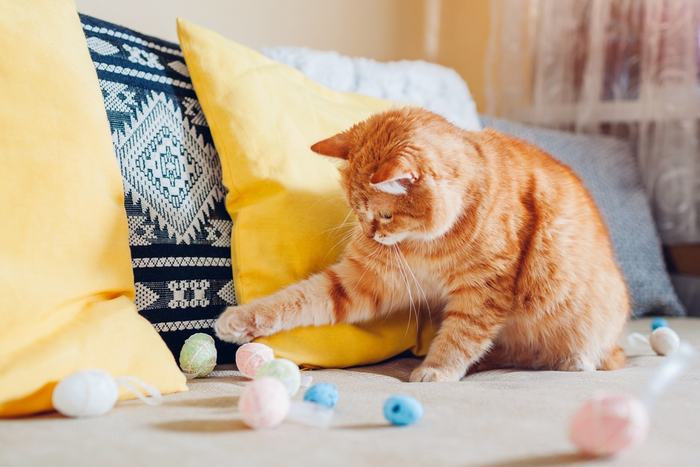
Set your new cat up for success by providing plenty of enrichment activities and spending time with them.
If your cat is also having some wobbles settling into their new home, there is plenty you can do to support them. When your new pet first arrives, keep them in a secure, quiet area first until they have settled in a bit.
Provide plenty of places to hide, which helps cats feel safe. Cats like to be up high, so a perch or accessible shelves are useful. Using cat pheromones such as Feliway, in a diffuser or sprays, can help anxious cats feel more relaxed and provide reassurance that their new home isn’t threatening.
So they don’t get bored and frustrated, make sure your cat has enough to occupy themselves, such as cat trees for climbing, puzzle feeders, and plenty of cat toys.
If your cat shows signs of separation anxiety or other negative cat behavior, such as extreme restlessness, excessive self-grooming, depression, lethargy, poor appetite, excessive meowing, or spraying urine outside the litter box, they might need more help.
Stress and illness can have similar symptoms in cats, and if you are concerned then contact a veterinarian. If the problem is behavioral, they might be able to prescribe anti-anxiety medications to help.
Also Read: 5 Ways To Build A Stronger Bond With Your Cat
New Pet Anxiety: Final Thoughts
It’s true that a new pet is a big responsibility, but it’s also a pleasure and a joy. If it’s all feeling a bit much, follow our strategy to prevent overwhelm: focus on the basics, enlist support, settle into a routine, form a bond, and be patient. Cats can also feel anxious in new homes, so provide plenty of hiding places, treats, and enrichment, and spend time with them to relieve their stress.
Frequently Asked Questions
Why am I so anxious about my new cat?
It’s a big responsibility to take on a new pet, and all the changes they bring can feel overwhelming. Make sure you have provided all the basics, enlist some support, and try to develop and bond and a routine, which will all help.
How long until a cat gets used to a new owner?
Generally, the rule of three is used. After three days, everything might seem a bit overwhelming, after three weeks they are starting to settle in, and after three months the majority of cats are perfectly settled.
How do I stop being scared of cats?
Getting over a fear of cats may involve gradual desensitization using exposure therapy. Genuine phobias may require professional help from a therapist to design a strategy.




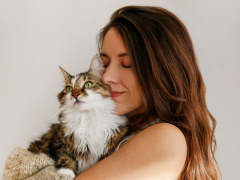
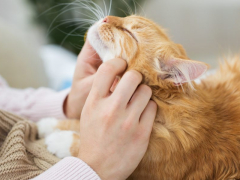


Hi, I’m taking care a of a cat, while the owner is on vacation, the owner seemed really nervous when he came back to see him ,
And said the cats hiding behaviour was strange, and running from home. He is grooming a lot, and half closes his eyes a lot;
The cat , could he be just responding to the owners fear of leaving him in a new place?
O r human nervousness in general/Ohio long does it take for a cat to forget about its original owner,
The owner thought it’s behaviour was weird.but earlier in the week, the cat was eating well, rolling on his back, and
Purring, and playing a lot.
He also follows me around the house like a dog. Is the cat anxious about who his owner is?
As the owner goes away a lot,
I m taking an are of the cat for a short time.
And cAn cats tell if you have a mental illness?
Thanks please write back,
Kemi.
Hi Kemi, thanks for the message! I wouldn’t blame mental illness—it’s normal for cats to become anxious when left with an unfamiliar person or under unfamiliar circumstances. However, the half-closed eyes and heavy grooming may also be indicative of a health issue, so if you’re also noticing changes in how much he eats, sleeps, or drinks, it may make sense to have him see a vet. Wishing you all the best!